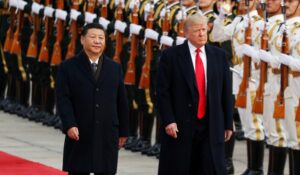Mercedes Benz’s parent company, Daimler, has reported that the escalating trade war between the United States and China is the reason they have cut its profit forecast. This statement comes after the announcement that each country will implement new tariffs beginning on July 6. These include the U.S.’s 25% tariffs on $50 billion worth of Chinese goods as well as the equal tariffs China is planning on imposing on the U.S. in retaliation. Earlier statements by Daimler had projected an increase in sales from last year, but the projections have now been altered and the company believes that 2018 earnings will be slightly lower than last year.
 It is logical to assume that all automakers have at least a slight concern regarding the tariffs. Other German automakers such as Volkswagen and BMW have released reports of lower shares, but Daimler is the first large one to openly announce its skepticism. A June 21, 2018 CBS News report indicated that Daimler manufactures many SUVs in the state of Alabama that are then shipped to China and make up over two-thirds of their cars sold there. Cars are included in the tariffs that China has imposed on the U.S.; therefore, Daimler has projected that sales will be hit hard by them due to decreasing sales and increasing costs.
It is logical to assume that all automakers have at least a slight concern regarding the tariffs. Other German automakers such as Volkswagen and BMW have released reports of lower shares, but Daimler is the first large one to openly announce its skepticism. A June 21, 2018 CBS News report indicated that Daimler manufactures many SUVs in the state of Alabama that are then shipped to China and make up over two-thirds of their cars sold there. Cars are included in the tariffs that China has imposed on the U.S.; therefore, Daimler has projected that sales will be hit hard by them due to decreasing sales and increasing costs.
An article from BBC News published on June 21, 2018 reported that the Trump administration has also threatened to impose tariffs of 10% on an additional $200 billion worth of Chinese goods if China “refuses to change its practices.” China, in turn, has promised to retaliate yet again, which could potentially cause more problems for automakers if things like auto parts and certain materials are included in this new group of goods. Initially, the tariffs were supposed to be beneficial for automakers, but now the future is uncertain. Mercedes has expressed concern, stating that the effect of severely increased tariffs and costs “cannot be fully compensated by the reallocation of vehicles to other markets.”
 It is important to note, however, that the tariffs may not be the only thing that is affecting Daimler’s projected downfall in sales. In addition to the tension between the U.S. and China, another BBC News article reported that Daimler was also hit with an order to recall many vehicles in Germany that had been manufactured with illegal software to rig diesel emissions. Additionally, recalled vehicles in Latin America as well as a decline in demand in that area also may have contributed to Daimler’s projections.
It is important to note, however, that the tariffs may not be the only thing that is affecting Daimler’s projected downfall in sales. In addition to the tension between the U.S. and China, another BBC News article reported that Daimler was also hit with an order to recall many vehicles in Germany that had been manufactured with illegal software to rig diesel emissions. Additionally, recalled vehicles in Latin America as well as a decline in demand in that area also may have contributed to Daimler’s projections.
Overall, stocks of companies in all sectors have fluctuated greatly since the announcement of the tariffs several weeks ago, and the auto industry has been no exception. Edward Taylor of Reuters reported that Daimler has said the company “would not be able to recover the costs from customers” if the possible full-scale trade war occurs. Automakers in other countries may also be impacted, including South Korea. SK Securities analyst Kwon Soon-woo indicated that South Korea may eventually be vulnerable to the new U.S. tariffs as well since South Koreans “have higher portions of vehicle imports in the U.S. than peers.” If the promised tariffs are indeed imposed starting in July, they could not only have an immense impact on the U.S. and China, but they could affect the entire global economy as well.
References
https://money.cnn.com/2018/06/20/investing/daimler-profit-us-china-trade/index.html
https://www.cbsnews.com/news/daimler-mercedes-facing-hit-because-of-u-s-china-trade-war/
https://www.bbc.com/news/business-44529600
https://www.bbc.com/news/business-44557267








